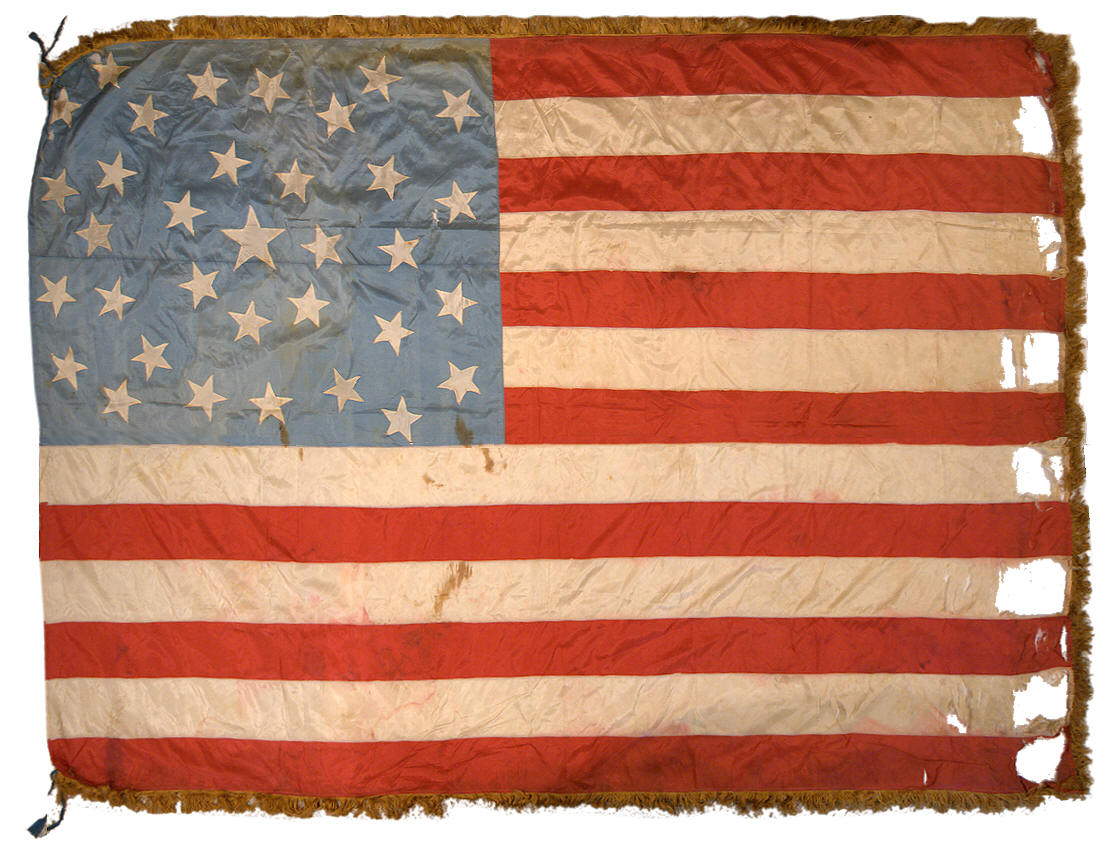|
 Civil
War period flags are among the most sought after in all
of flag collecting. Occasionally, as in the case
of this flag, specific provenance for the flag is lost
in time, as the flag passes down through families and
generation after generation, families expand and move
apart. Although a flag's specific provenance may
not always be known, by examining the construction and
with knowledge about the history of flags, it's possible
to ascertain, with a reasonable degree of certainty, why
a flag was made and how it was used. Such is the
case with this flag. In all likelihood, this flag
was a Union company presentation color, made and
presented to a Union company at the outset of the Civil
War when they mustered into service. Civil
War period flags are among the most sought after in all
of flag collecting. Occasionally, as in the case
of this flag, specific provenance for the flag is lost
in time, as the flag passes down through families and
generation after generation, families expand and move
apart. Although a flag's specific provenance may
not always be known, by examining the construction and
with knowledge about the history of flags, it's possible
to ascertain, with a reasonable degree of certainty, why
a flag was made and how it was used. Such is the
case with this flag. In all likelihood, this flag
was a Union company presentation color, made and
presented to a Union company at the outset of the Civil
War when they mustered into service.
The 34 stars on this
flag are formed into a beautiful double medallion
pattern, with three stars in each corner, forming a
parenthesis around the circular medallions. The
star count is consistent with a presentation color made
at the outset of the Civil War, circa 1861. The
entire flag is constructed of silk, which is the
preferred material for a military grade battle flag, and
the fine silk gold fringe that borders the flag is yet
another precise feature of a flag made for military use.
The size and proportions of the flag are also
approximately correct for a company grade flag, and the
silk ties on the corners, which appear to have become
separated and re-tied at some point, are also found on
silk battle flags of the period. Some of the stars
of the flag have arms that have lifted from the blue
field, and it's apparent that, on both sides of the
flag, the blue under the stars is a shade dark than the
rest of the field, indicating that the flag received
sunlight on both sides, resulting in even fading.
This, along with the apparent wear on the fly end of the
flag, is evidence that the flag was not only presented
to, but also flown by, the receiving unit.
The flag descended in
the family of Mr. Mark Alexander, having passed down
through his father, Mr. Raymond D. Alexander, who served
as a sergeant in the U.S. Army's 41st Division in World
War II, from his grandfather, Mr. Glen Alexander, who
served in World War I. Beyond this point, the
flag's chain of descent is not yet known, but with
diligence and time, it may be possible to trace the flag
back to its owner and possibly to the unit that once
carried it in the Civil War. Regardless of its
specific history, the flag is an exceptionally rare
example of high quality flag making in the mid-19th
century. With its beautiful sky blue field, unique
medallion pattern, fine silk fringe and vibrant red and
white silk stripes, the flag is a rare survivor of the
great struggle to preserve the Union.
|

